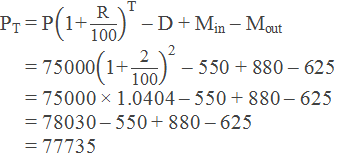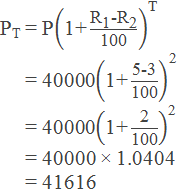
The population of any country does not remain constant. It
generally increases. The relative increase of population over an interval of
time is called population growth.
Growth per unit time is called growth rate.
The way of increasing population is exactly similar to the way
of increasing compound amount, because, every year population increases from
the previously increased population also.
So, the population of a country or place after T years is given
by the formula,

P --------> Initial population
PT -------> Population after T years
R --------> Rate of growth in % per year
T --------> Time in no. of years
The growth of the population is also affected by the number of
deaths, in-migrants, and out-migrants at the end of the given period of time. In
this case,

D ---------> Number of deaths
Min -------> In-migrants
Mout ------> Out-migrants
********************
10 Math Problems officially announces the release of Quick Math Solver and 10 Math Problems, Apps on Google Play Store for students around the world.
********************
********************
Some other formulas,
1. If R1%, R2% and R3% be the rate of population growth of 3 successive years then the population after 3 years is given by:

2. If R1% be the yearly birth rate, R2% be the yearly death rate, then the population after T years is given by:

Workout Examples
Example 1: The population of a town before 2 years was 75000 and the rate of
annual growth of the population of the town is 2%. If the number of in-migrants and
out-migrants at the end of 2 years were 880 and 625 respectively and 550 people
died within this time interval, find the present population of the town.
Solution:
Here,
P = 75000
R = 2%
Min = 880
Mout = 625
D = 550
PT = ?
We have,

So, the present population
of the town is 77735
Example 2: The present population of a town is 40000. If the yearly birth rate
is 5% and death rate is 3%, what will be the population of town after 2 years?
Solution:
Here,
P = 40000
R1 = 5%, R1
= 3%
T = 2 years
PT = ?
We have,

So, the population of the
town after 2 years will be 41616.
Example 3: The population of a village increases every year by 5%. At the end
of two years, the total population of the village was 10000. If 1025 were
migrated to other places, what was the population of the village in the
beginning?
Solution:
Here,
Total population including
the migrated number,
PT = 10000 +
1025 = 11025
R = 5%
T = 2 years
Present population, P = ?
We have,

So, the population of the
village in the beginning was 10000.
Example 4: The population of a town before 3 years was 150000. If the annual
growth rates of the population in the last 3 years were 2%, 4% and 5%
respectively every year, find the population of the town at the end of 3 years.
Solution:
Here,
P = 150000
R1 = 2%, R2
= 4% and R3 = 5%
T = 3 years
PT = ?
We have,

So, the population of the
town at the end of 3 years is 167076.
Example 5: 3years ago, the population of a village was 50000. The population
growth rate of village is 2% p.a. 1 year before 420 people died due to an
epidemic. Find the present population of the village.
Solution:
Here,
P = 50000
R = 2%
After 2 years (i.e. 1 year
before), T = 2 years

After 2 years, 420 people
died due to epidemic. So,
P = 52020 – 420 = 51600
Then, after 1 year (i.e.
at present), T = 1 years

So, the present population
of the village is 52632.
If you have any questions or problems regarding population growth, you can ask them here, in the comment section below.
Was this article helpful? Follow
and SHARE with your friends…



❤️❤️ like this app
ReplyDelete